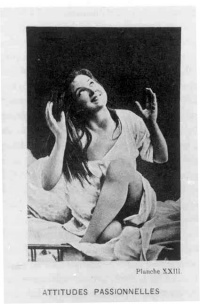Désiré-Magloire Bourneville
From The Art and Popular Culture Encyclopedia
| Revision as of 09:21, 12 August 2011 Jahsonic (Talk | contribs) ← Previous diff |
Current revision Jahsonic (Talk | contribs) |
||
| Line 1: | Line 1: | ||
| + | [[Image:Louise Augustine as photographed in Planche XXIII of 'Attitudes passionnelles'.jpg|thumb|left|200px|Planche XXIII of ''[[Attitudes passionnelles]]'', a series of ten photographs first published in the book ''[[Iconographie photographique de la Salpêtrière]]'' (1875 - 1879). The photo depicts [[Pitié-Salpêtrière Hospital |Salpêtrière]] star patient [[Louise Augustine]].]] | ||
| {{Template}} | {{Template}} | ||
| '''Désiré-Magloire Bourneville''' (October 20, 1840 – May 28, 1909) was a French [[neurologist]] born in [[Garencières]]. He studied medicine in Paris, and was an intern at the [[Salpêtrière]] and [[Bicêtre]] Hospitals. | '''Désiré-Magloire Bourneville''' (October 20, 1840 – May 28, 1909) was a French [[neurologist]] born in [[Garencières]]. He studied medicine in Paris, and was an intern at the [[Salpêtrière]] and [[Bicêtre]] Hospitals. | ||
Current revision

|
Related e |
|
Featured: |
Désiré-Magloire Bourneville (October 20, 1840 – May 28, 1909) was a French neurologist born in Garencières. He studied medicine in Paris, and was an intern at the Salpêtrière and Bicêtre Hospitals.
In 1866, during a severe cholera epidemic in Amiens he volunteered his services, and after the siege was presented with a gold watch as an expression of the city's gratitude. During the Franco-Prussian War he was both a surgeon and an assistant medical officer. During the Paris Commune in 1871, when revolutionaries wanted to execute some wounded prisoners, Bourneville intervened and saved them from death. During the 1870s, he became a member of the French Parliament (1873) and the Paris City Council (1876), and in both positions advocated reforms of the health system.
Bourneville was a physician of pediatric services at Bicêtre from 1879 to 1905. He also founded a day school in Paris for special instruction of mentally retarded and epileptic children.
He first described a disease which is named after him, called "Bourneville's syndrome", which is now known as tuberous sclerosis. This genetic condition may lead to mental retardation, epilepsy, a disfiguring facial rash and benign tumors in the brain, heart, kidney and other organs. The condition was also studied by the British dermatologist, John James Pringle, leading some historical texts to refer to it as Bourneville-Pringle disease.
See also

